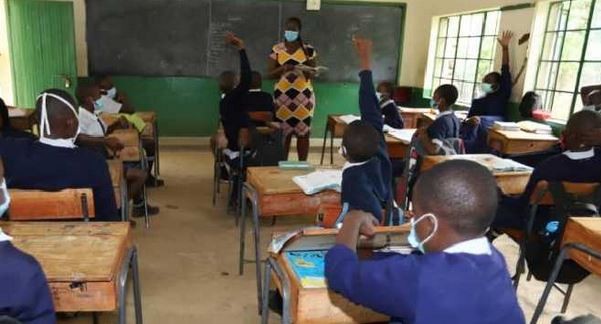 Learners attending to their teacher
Learners attending to their teacher
Somewhere in Kenya, a family might just see an increase in the portion of ugali in their sufuria due to resumption of learning tomorrow.
Those selling textbooks and uniforms, for instance, are making a kill as parents prepare for re-opening of schools after almost 10 months of forced closure by the coronavirus pandemic.
The shutdown of the education eco-system led to thousands of private school teachers going without a pay cheque, but there is hope that many of them will now get their jobs back.
It also means extra income for that boda boda rider who now sees an expansion in the pool of customers as children move from their homes to school.
The transport sector, including matatus, will be buoyed by a resumption in learning. More petrol will be consumed as school buses roar back to life - and this does not only mean more income to petrol stations, but also to the government.
For eight months, small towns that had been powered by institutions of learning have been quiet and hostels, restaurants and pubs experienced huge declines in business.
Because of the critical role that the education sector holds in rebooting the country’s economy from the damage of Covid-19, President Uhuru Kenyatta’s administration plans to roll out a Sh386 billion package that will seep into almost every sector of the economy.
And the money will not only go to the conventional beneficiaries of the education supply chain such as farmers, teachers, bookshops and publishers. There will be new actors such as counsellors, dealers in sanitisers and computers and ICT service providers. A big chunk of the money, Sh152.1 billion, will support the free day secondary school programme.
Universities will also receive a significant Sh103.3 billion for admission of undergraduate students.
In the Post Covid-19 Economic Recovery Strategy, in which the government plans to spend close to Sh930 billion to stimulate the economy, Treasury noted that the prolonged closure of learning institutions had exposed children to social isolation and stigma, child labour, drug and substance abuse, early marriage and other forms of abuse.
The closure has also increased inequality due to inability of parents to facilitate distance home schooling, Treasury said.
“At the same time, a number of private schools have not been able to meet their financial obligations with a possibility of some closing down and others laying off staff hence affecting the primary to secondary school transition rate,” it said.
The government has sought to remedy the situation by putting together a stimulus package that will have a multiplier effect on other sectors such as health, retail, ICT and agriculture.
The World Bank, in its latest Kenya Economic Update, projected that the economy would contract by one per cent in 2020 in the baseline scenario, and by 1.5 per cent in a more adverse scenario.
This was a downgrade from an earlier projection of 1.5 per cent growth, and it was mostly due to nearly zero output of the education sector following the closure of institutions in March.
But if the education sector contributed to the drop in economic output last year, it will also play a major role in its rebound in 2021, according to the World Bank.
The global lender expects the economy to rebound relatively quickly in 2021, lifting real gross domestic product (GDP) by 6.9 per cent year-on-year.
“A major factor in this strong rebound is the impact on the national accounts of measured education sector output normalising, which is projected to add 2.2 percentage points to real GDP growth next year,” said the World Bank report.
Children safety
After months of staying at home, all children are expected back to school on Monday. It will not be an easy decision for most parents.
Many are not convinced that their children will be safe. The virus is yet to be vanquished and crowded classrooms are likely to boost it.
The government has promised to ensure compliance with social distance rules in schools and through official documents has hinted at procuring face masks and sanitisers for all children.
Moreover, if the post Covid-19 strategy is anything to go by, a lot of efforts will be put in place to encourage remote learning, with a lot of money being channeled into the development of e-learning materials.
For some parents, the health risk is less of a worry as the struggle to meet the financial cost of sending their children back to school.
Schools have hiked their fees by including arrears from the previous year.




No comments :
Post a Comment